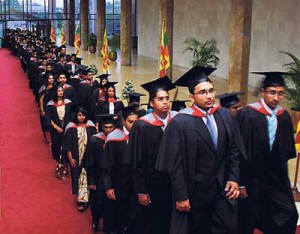Another English, not quite
View(s):More recently, a handful of private and government colleges in Bangalore have also opted for Communicative English
When Communicative English was introduced countrywide as a vocational subject by the University Grants Commission in 1994, English Departments in a handful of Bangalore colleges took the new baby under their wing. It was exhilarating to be building something with so much potential for creative expression as a gateway to new and emerging fields of employment for young graduates.
The challenges were manifold. “Comm English,” as the fledgling was and still is, affectionately called, would have to justify its special status as a vocational subject.
Most sought-after
In the nearly two decades since its inception, Communicative English has evolved into one of the most relevant and sought-after undergraduate courses in Bangalore. As its ambit has grown, so has the nomenclature of the course but the essence remains the same — to equip students with skills that will stand them in good stead when they enter the workforce. More recently, a handful of private and government colleges in Bangalore have also opted for Communicative English. Here, the challenge is mainly to equip students, who have studied through a medium of instruction other than English, with spoken and written skills that will help them to communicate with proficiency in a variety of situations.
A mixed bag
In the pioneering colleges, Communicative English can broadly be described as a practical journalism course which trains students to write for the print and electronic media. However, what is on offer everywhere is a mixed bag, with individual colleges imparting training in diverse areas ranging from creative writing to public speaking and research methodology —anything and everything that will give their students the competitive edge when it comes to employment.
So, how have students responded to this core idea? Karthik Bhat, batch of 2006 at Christ College and currently a Producer with Opticus Inc., an ad film production house in Mumbai, recalls: “the idea of a job was scary and we kept hearing everyone say ‘it’s going to be difficult…’ But today, everyone around is happily employed doing what they always wanted to”.
Over the three hectic years of this practical course, students churn out records, job reports, practical assignments and research papers at a feverish pace, pulling off festivals and book exhibitions, seminars and events with equal aplomb. They are aware that what they get out of these three years will be directly proportionate to what they put.
As Rahul Dayama, who graduated from Vijaya College just last year, emphasises, “The course judged me on my creativity and not on my exam scores. This makes it different from other courses on offer.”
Internship
The high point, for most, is the internships. Says Rahul: “My internships with the leading media houses helped me pick up professional tricks quite early in life.” The internships helped Nandini Hegde decide her area of interest. Nandini, who teaches filmmaking at Jain Animation School in Bangalore, passed out of Jyothi Nivas in 2008. “My favourite part of the course was shooting our documentary. It was a fun and enlightening experience that I cherish till date,” she says. Samragni, now in her final year of “Integrated Communication Studies” (ICS) as the course is called at Mount Carmel, agrees. “You get a glimpse of what a career in a field you want looks like,” she says.
Portfolio
The portfolio a serious student takes away from the course consists of lab journal articles in different formats, radio features, television news bulletins and short documentaries, in addition to a dissertation, and opens up a whole new world of possibilities. While still in college, students are delighted to get paid for freelance work they do during and after their internships, in addition to bylines and hands-on experience. Later on, newspapers sign up fresh graduates as sub-editors or reporters, and television channels take them in as bureau reporters, desk staff, or as part of the programming and production teams, and here the portfolio is quite invaluable.
“All the fat job reports we had to write made us appreciate and analyse the work we did during our internships and of course improved our English and presentation skills,” says Indira P., Kartik’s contemporary at Christ. Indira got her first job with Google Adwords in a campus recruitment drive. Later, she essayed other roles including one with a manufacturing company in the UAE and another with a Telugu channel in Hyderabad. “Tons of long hours and hard work, but completely worth the effort,” she says — a comment that could be applied to the Communicative English course as well.
-thehindu.com
Follow @timesonlinelk
comments powered by Disqus



























